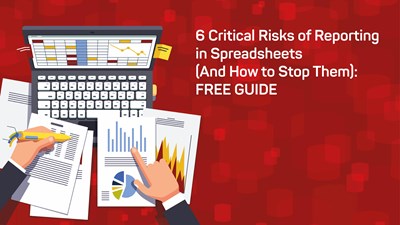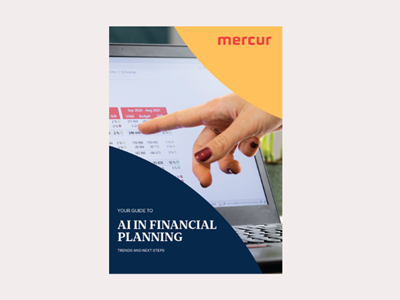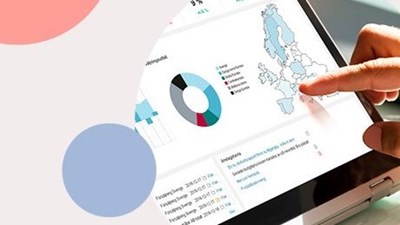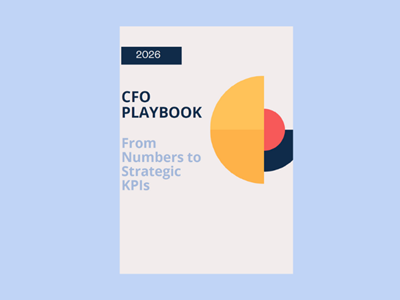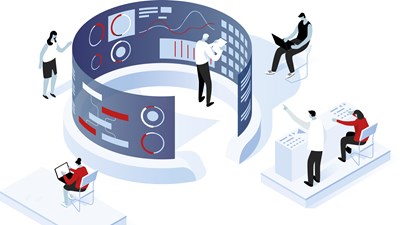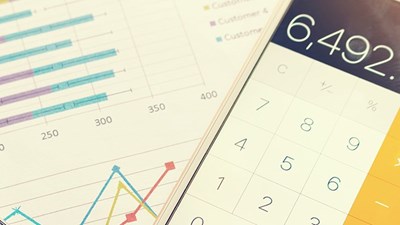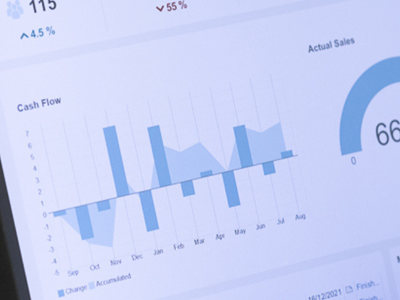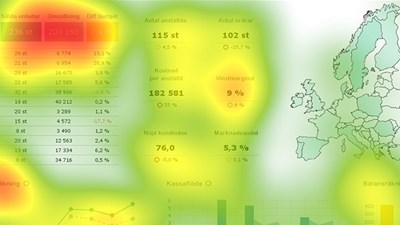
Rolling Forecasts: Practical Steps, Benefits, and How to Get Started
Financial planning has changed. Traditional annual budgets can’t keep up with rapid shifts in the market, evolving customer needs, and internal performance dynamics. That’s why many finance teams are turning to a rolling forecast model, a more flexible and responsive approach to planning that updates throughout the year.
In this guide, we’ll walk through what a rolling forecast is, why it matters, how it compares to static budgets and the practical steps to implement one. If your organisation wants to make smarter, faster decisions, this might be the change you need.
What Is a Rolling Forecast?
A rolling forecast is a continuous planning process that adds a new future period as the most recent period ends. It is usually done monthly or quarterly. Rolling forecasts:
Always look ahead and move forward as time passes
Use the latest results and information right away
Keep updating plans and guesses often to stay accurate
Instead of committing to a rigid plan once a year, you’re creating a living model that evolves with your business. This means more agile planning that helps you respond proactively to change.
Rolling forecasts have become increasingly relevant as businesses face more frequent and unpredictable shifts. They enable teams to stay aligned and adjust course quickly.
Rolling Forecast vs. Static Budget
Most companies still rely on static budgets: fixed plans built months in advance and rarely revisited. However, static models often don’t reflect the unexpected situations that come up in daily operations.
On the other hand, rolling forecasts:
Remain relevant throughout the year
Are updated based on real-time data
Help you make more rational decisions
Static budgets can be too rigid, leading to spending that doesn’t match reality, missed chances or last-minute cuts. Rolling forecasts, on the other hand, make planning more flexible and help keep financial goals aligned with what’s actually happening in the business.
Benefits of Rolling Forecasts for Financial Planning
The transition to a rolling forecast model can have significant value across your organisation. Let’s break down the key benefits of rolling forecasts in financial planning:
Improved Risk Analysis
Since data is refreshed more frequently, potential risks are easier to detect early. That means finance leaders can take corrective action before issues become more costly or disruptive.
Better Accuracy in Planning
Frequent updates based on the latest actuals lead to more accurate forecasts. This helps reduce the margin of error and builds greater confidence in financial decision-making.
Faster Decision-Making
With rolling forecasts, current data is readily available to you, so you don’t need to wait for year-end reviews to make strategic calls. It makes it easier to react quickly and make smarter decisions in real time.
Enhanced Flexibility and Responsiveness
The ability to revise projections mid-year is one of the biggest advantages of rolling forecast budgeting. When something changes, whether it be demand spikes, supply chain disruptions or market shifts, you’re not stuck with outdated assumptions.
Long-term Visibility Across Fiscal Years
Because the model looks beyond the current fiscal year, leadership can identify trends, plan for upcoming investments and align operational decisions with long-term goals.
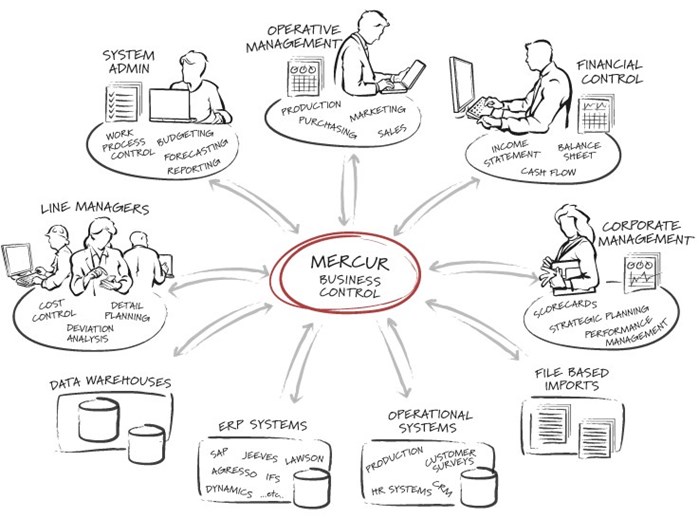
How to Create a Rolling Forecast
Getting started with a rolling forecast doesn’t have to be overwhelming. Follow these steps to build a process that works for your organisation:
1. Define Objectives
Start by being clear on what you want your forecast to do. Is it about hitting revenue goals, keeping costs in check or supporting bigger strategic plans? That purpose will shape how you build and focus your model.
2. Set Timeframe and Frequency
Decide how far into the future your forecast will extend and how often it will be updated. Many organisations use a 12- or 18-month rolling window, refreshing it monthly or quarterly.
3. Identify Contributors and Value Drivers
Determine who will be involved in the process (e.g., finance, sales, operations) and what performance drivers they will track (e.g., product demand, pricing trends or staffing costs).
4. Verify Data Sources
Next, make sure you’re working with clean, reliable data. Your forecast needs to be as accurate as possible and reflect your current business standing.
5. Run Scenario Analysis
Use scenario planning to test how different variables might impact results. This helps prepare for unexpected situations and gives you context when assessing strategic choices.
6. Measure Variance and Adapt
Compare your forecast to what actually happened, then dig into the differences. Use what you learn to tweak your assumptions, sharpen your forecasting and improve planning across teams
Rolling Forecast Best Practices
Building a successful rolling forecast process isn’t always a simple step-by-step task. There may be more variables to take into account depending on the business. Here are some best practices that will help you create a functioning forecast:
Link to strategic goals – Make sure your forecast supports where the business is headed based on your progress so far.
Integrate into day-to-day operations – It should be part of how you run the business, not just a finance exercise done once a quarter.
Promote cross-department collaboration – Get input from across the company so your forecast reflects what’s really happening on the ground.
Automate and update regularly – The fewer manual steps involved, the easier it is to keep your forecast current and useful.
Choose the right technology – The right tools can make the whole process faster, more accurate and easier to scale.
Choosing the Right Rolling Forecast Software
Technology plays a key role in keeping rolling forecasts running smoothly. Manual work slows things down, leads to errors and gets harder to manage as the business grows. The right software helps you stay efficient and keep things on track.
Benefits of using modern tools include:
Automatic data updates from ERP and BI systems – You get real-time numbers without chasing spreadsheets or waiting on reports.
Built-in workflow and version control – Everyone stays on the same page, and you avoid confusion over which version is the latest.
Easy scenario modelling and visual dashboards – You can quickly test different assumptions and see the impact at a glance.
If your organisation is considering an upgrade, Mercur’s planning platform offers powerful forecasting capabilities with pre-built connectors and enterprise-level performance.
Is It Time to Replace Your Budget with a Rolling Forecast?
If your financial planning process feels out of sync with business demands, it might be time to adopt a rolling forecast. It brings better accuracy, real-time insights and flexibility across your organisation.
Start by evaluating your current tools and processes. Think about where your static budget is falling short and where rolling models could help your team respond more quickly.
Book a demo to see how Mercur supports rolling forecast automation and eliminates the costs of traditional budgeting.
Download the infographic "The Power of Rolling Forecasts"
Want to know more?
Rolling Forecast FAQs
What is a rolling forecast?
It’s a financial planning model that updates projections regularly and extends the forecast window with each new period. It’s more flexible and responsive than traditional budgeting.
How do you create a rolling forecast?
You start by defining your goals, setting a time window, involving the right teams, verifying data quality, running scenarios and measuring results against actuals.
What’s the difference between a static and rolling forecast?
A static budget is created once a year and doesn’t change. A rolling forecast updates frequently and reflects ongoing performance, making it better suited for fast-changing environments.
What is an example of a rolling forecast?
A company forecasting sales for the next 12 months will update this forecast monthly. When one month ends, another is added, so there’s always a forward-looking 12-month view.
 Blog
BlogMastering Spreadsheets
Where many businesses start small, a simple spreadsheet can adequately perform the limited tasks required of it. As the company grows, your spreadsheets can get more complex and harder to manage, by which point it feels like it will be too difficult to move to a different reporting tool.
 Blog
BlogAI in Financial Planning: Trends and Next Steps
Discover how finance teams are using AI to drive smarter planning, faster insights, and stronger business decisions.
 Blog
BlogWhat is management reporting?
Management Reporting refers to the process of creating, analyzing, and presenting information about various aspects of an organization's performance to enable decision-makers to make well-informed decisions about the future.
 Blog
BlogBusiness Budgeting Software: How to Choose the Right One
Choosing budgeting software is partly a finance and partly a strategic decision. The right tool helps organisations organise planning cycles, adapt as the market changes and increase accountability across departments. But not every platform will be a good fit.
 Blog
BlogThe Business Benefits of Integrated Business Planning
This blog explores what IBP is and the typical IBP process. We highlight business benefits and how the right software can be a game-changer for your organisation.
 Blog
BlogThe Role of the CFO: Top Priorities and Responsibilities
Today's finance leaders steer more than just budgets and reports. The digital transformation ramps up with the increase of corporate complexity, and so does the role of CFOs.
 Blog
BlogWhy is our Excel-based budget always out of date?
Excel creates outdated budgets. Every time someone enters a figure, sends a file, or waits for another department to finish their section, your budget falls further behind reality.
 Blog
BlogVariance Analysis: A Comprehensive Guide
Senior executives are demanding more detail in their management reports. The amount of data available to finance departments has exploded and decision makers see this as an opportunity to get more insight into how the business is performing.
 Blog
BlogTop-Down vs Bottom-Up Budgeting
Budgeting aligns resources with strategic goals, and there are two primary approaches: top-down and bottom-up. Which method wroks best?
 Blog
BlogAI in Finance as a Powerful Tool
In this post, we explore how AI is evolving from a theoretical concept into a valuable resource for decision-making. Get useful insights for finance teams at any stage, from early exploration to actively using AI-powered solutions.
 Blog
BlogThe Hidden Cost of Data Silos
If you ever feel like your teams speak different languages when it comes to data, it is a classic symptom of data silos. The information gets stuck in one department, system or tool, making it difficult for anyone to see the full picture.
 Blog
BlogBetter Revenue Planning
Sales forecasting is the process of predicting future revenue based on past data and trends. Read the blog to learn the best methods to do it right.
 Blog
BlogBalancing Profitability and Sustainability
Sustainability has become a central concern for organisations across the world — and the UK is no exception. This evolving landscape places new demands on financial reporting.
 Blog
BlogTop 7 Manager KPIs for Financial and Operational Success
In today's post we'll break down why KPIs matter, which ones offer the most insight for finance and executive teams and how to ensure they're actually driving results.
 Blog
Blog3‑Statement Model for Better Financial Forecasting
Financial forecasting is critical for any business that wants to adapt to change. But finance teams keep usingfragmented models and manual processes. The 3-statement financial model is the solution.
 Blog
BlogManagement Reporting Guide: Definition and Tips
Management reporting helps you see what’s really happening in your business. In this guide, we’ll explain what managerial reporting looks like and share practical tips.
 Blog
BlogSave time and create a successful budget process
If you’re working in a large organization, you’re probably aware of how time-consuming the budget process can be. In this article we’ll give you tips on how to save time and still create a successful budget process
 Blog
BlogInformed Business Decisions at Maximum Velocity
The ability to process information swiftly is essential. If your business can’t manage your data efficiently, your company’s financial performance will surely underperform. At Mercur we have developed our own database Veloxic which helps Financial Planning and Analysis.
 Blog
BlogThe Powerhouse of EPM Tools
A business’s success heavily relies on having a strong strategy. However, what's even more important is implementing that strategy while tracking and measuring the performance. This can easily be done by investing in enterprise performance management (EPM) software.
 Blog
BlogBudgeting in a modern world
Thirty years after its debut, Microsoft Excel is still the preferred tool for budgeting and planning projects. However, its popularity is declining, due in most part to the rise of technology and subscription-based pricing for a myriad of SaaS-based products.
 Blog
BlogCash Flow Forecasting
Inaccurate cash flow forecasting can be a costly mistake for companies. In today’s volatile market, relying on static annual budgets or manual spreadsheets leaves financial leaders without the agility to respond to uncertainty.
 Blog
BlogHow To Create a Successful Budgeting Process
When done well, budgeting helps organisations stay financially on course, even when things don’t go exactly as planned. Learn how to keep things on track so you avoid surprises and stay focused on your goals.
 Blog
BlogBusiness Intelligence Reporting For Finance Teams
The real challenge today isn’t collecting data, it’s making sense of it and fast. Organisations turn to business intelligence (BI) to convert raw data into insight.But how do you actually do it right?
 Blog
BlogWhat Is Planning, Budgeting and Forecasting?
Planning, budgeting and forecasting are rarely static. Shifts in the industry often require you to revisit assumptions, adjust targets and adopt new processes. Learn how to strengthen your approach and stay ahead of change.
 Blog
BlogScenario Planning - Better control during uncertain times
Uncertain times create the need for more frequent forecasts and time for analyzing and comparing different future scenarios. We give you 5 tips on how to simulate future scenarios using scenario planning
 Blog
BlogCFO Playbook - KPIs for 2026
The role of the CFO is changing fast. Today, the finance function is expected to deliver more than reports — it must drive direction, speed and profitability through clear, actionable KPIs. Learn more in this guide.
 Blog
BlogAI in corporate budgeting
Artificial Intelligence (AI) can support decision making in key areas such as budgeting, capital allocation and even corporate strategy and as a result, it is increasingly being deployed in corporate performance management tools (CPM).
 Blog
BlogZero-Based vs. Incremental Budgeting
Budgeting sits at the heart of sound financial management. This is why choosing the right technique is crucial for CFOs – it shapes resource allocation, cost control and strategic agility. Incremental and zero-based budgeting are two leading methods that offer distinct approaches.
 Blog
BlogHow EPM Transforms Financial Planning and Forecasting
Struggling to keep plans aligned in a changing market? Discover how EPM helps finance teams move faster, stay accurate and lead with real-time insights.
 Blog
BlogHow do finance teams track KPIs across the entire organisation?
Learn how finance teams track KPIs across the entire organisation by consolidating data from multiple sources into a unified system like Mercur.
 Blog
BlogHow to get accurate financial reports without waiting for month-end
You don't need to wait until month-end to see accurate financial reports. With modern financial systems you can access up-to-date reports whenever you need them.
 Blog
BlogWhat Is FP&A? Definition, Purpose, and Best Practices
Without solid financial planning and analysis (FP&A), businesses operate in the dark. In this post we go deeper into the process of FP&A and why it’s important for businesses.
 Blog
BlogWhy xP&A is a powerful game-changer
The newest iteration of planning, analysis and reporting systems is a powerful game-changer that unites company departments and boosts competitiveness. It’s called xP&A – the abbreviation of extended financial planning and analysis.
 Blog
BlogHow Automated Reporting Will Transform FP&A in 2026
This article highlights the power of report automation, how to implement it in your business and explores any new opportunities for accurate financial analysis in the long run.
 Blog
BlogFive tips for a successful budget process!
How can you make your budget process more successful and maximise the effort that was invested in creating it? Of course, there are many factors to consider but we’ve chosen to highlight five key areas that will enable and help you create a smoother, value-creating and collaborative budget process.
 Blog
BlogFP&A Trends Shaping Financial Planning in 2025
Many organisations cope with fragmented planning and data quality issues, which slow down their forecasting cycles. This forces organisations to take practical steps to turn ambition into execution.
 Blog
BlogTop PowerBI Alternatives in 2025
Explore the top PowerBI alternatives for 2025. Discover how Mercur delivers integrated planning, budgeting and reporting without the high cost and complexity.
 Blog
BlogThe Collaborative, Smarter Budget
In many organisations manual budgeting processes over-burden staff and create masses of data which overwhelms department heads and stops them seeing the bigger picture.
 Blog
BlogSpreadsheets Risk the Future of the Business
Spreadsheets often start as just a list for storing information and there is minimal process documentation, support or maintenance for these worksheets. Despite the fact that desktop applications such as Microsoft Office are included in the standard configuration of users' PCs, very little formal training is ever given to spreadsheet users.
 Blog
BlogAI and Machine Learning, what is it, and why is it important for the future?
Artificial Intelligence and Machine Learning, what is it, and what is the difference?
 Blog
BlogWhat is Corporate Performance Management? (CPM)
CPM, or Corporate Performance Management, is a process within corporate management aimed at measuring and optimizing the performance of an organization. CPM encompasses a range of activities, including budgeting, planning, forecasting, reporting, and analysis.
 Blog
BlogRisks with working in spreadsheets
Spreadsheets are an essential tool for all types of organisations and businesses rely on them heavily, particularly for financial computations. The most popular spreadsheet program globally is, of course, Microsoft Excel, it’s used by an estimated 750 million people.
 Blog
BlogHow to succeed with your planning, budgeting, and forecasting process
We know it can be challenging to succeed with your planning, budgeting, and forecasting process. Therefore, we have gathered our best tips for you to succeed!
 Blog
BlogFrom static budgets to agile financial management
Traditional budgeting has long been the cornerstone of financial planning in businesses. But today it can become more of a limitation than a strength. That’s where the concept of Beyond Budgeting comes in.
 Blog
BlogSpreadsheet Risk Management: Best Practices for 2025
Excel has long been a target for hackers; just one click on a malicious attachment can infect your entire network. So, how can you keep using spreadsheets while not sacrificing your safety?
 Blog
BlogA practcial guide to scenario planning
Scenario planning gives you a clear, practical way to test assumptions, spot risks and opportunities, and make better strategic choices so your organisation stays resilient when conditions change.
 Blog
BlogBuild Long-Range Planning for Business Success
Discover how effective long-range planning aligns strategy, finance and operations for smarter decisions and sustainable growth.
 Blog
BlogHow to Effectively Budget with Driver-Based Forecasting
Traditional models of forecasting rely on historical data and beliefs. It uses techniques that identify patterns, which are simple to use. However, with these methods, there are some challenges because they are not dynamic with today’s market, and can’t effectively analyse complex data.
 Blog
BlogHow can AI help CFOs make better decisions?
Artificial Intelligence (AI) has significant potential to enhance decision-making for Chief Financial Officers (CFOs) by providing data-driven insights, automating routine tasks, and enabling more accurate forecasts.
 Blog
BlogSpreadsheets are not Collaborative Tools
Spreadsheets were never designed for collaboration, yet they are the single most used program among teams and co-workers. They often start out as a quick document for storing, formatting or calculating information but evolve into important documents and are often the core records for an organisation.
 Blog
BlogBest Guide to Improve Your Revenue with Flexible Budgeting
Optimise your expenses with flexible budgeting, and learn how to adjust budget to reflect current business activities, market changes and cost fluctuations.
 Blog
BlogBoost Report Readability, Engagement, and Decision-Making
In today’s fast-paced business environment, effective reports and dashboards are crucial for decision-making. Our user study using eye-tracking technology revealed seven key insights into what captures attention.

